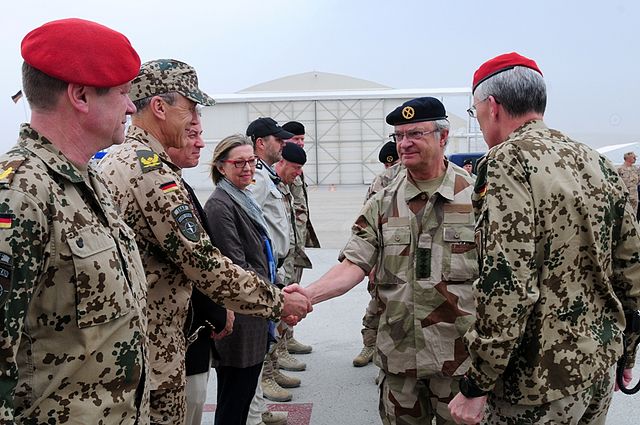 Swedish King Carl XVI Gustaf Visiting ISAF | Credit: ISAF Headquarters Public Affairs Office
Swedish King Carl XVI Gustaf Visiting ISAF | Credit: ISAF Headquarters Public Affairs Office
Should Sweden and Finland Join NATO?
Russia’s invasion of Ukraine has shaken European politics to its core. Nations are abandoning long-standing policies and traditions of neutrality in favor of a more defensive stance against Russia. The North Atlantic Treaty Organization has been reinvigorated as the organization announced new battle groups deployed in Central and Eastern Europe. However, what remains the most surprising revelation of all is Finland and Sweden’s consideration to join NATO, breaking decades of formal nonalignment foreign policy. While both countries are members of the European Union (EU) and partner with NATO on initiatives, Sweden and Finland have always been hesitant to join the alliance formally. However, in recent weeks public support in Finland and Sweden has favored NATO membership following Russia’s actions in Ukraine. While both nations have yet to formally announce their candidacies, it is worth considering whether NATO should accept Sweden and Finland as members or have them remain as partners.
A solid case can be made that Finland and Sweden would strengthen the alliance and improve European security. If Russia were to increase tensions within the Baltic states, having effective control over the Baltic Sea would provide another avenue to reinforce the defenses in Eastern Europe. Additionally, both nations would provide additional battle expertise and defense equipment. Finland has a historic record of capable defense, evidenced in the 1939-40 Winter War, and Sweden maintains a formidable submarine fleet that can patrol the Baltic waters. Their military capabilities could be a boon for a European defense industrial base. Lastly, both have partnered with NATO through the Partnership for Peace initiative since the 1990s, providing them with a strong familiarity of NATO’s tactical doctrine and strategic insights. If NATO accepts their applications, both countries would quickly join the alliance as official members.
On the other hand, admitting these two nations could create some liabilities and increase some of the tensions that previously caused tension in the NATO alliance. Both Sweden and Finland have spent less than the required 2% of GDP on their defense, and their readiness has arguably declined since the end of the Cold War. This was seen in 2010 when Sweden eliminated conscription yet was forced to reimplement it in 2017 after finding it could not find sufficient recruits. Finland does have conscription for its military, though it has repeatedly spent less than 2% of its GDP on defense, harming its overall readiness in case of war. If Sweden and Finland are not up to defending their borders, then their admittance into NATO will be a burden to a continent already struggling with its defense readiness. Another significant reason both nations should not enter NATO is that it can increase tensions with Russia that can escalate into war. Russia already feels threatened by NATO expansion, and if Finland joins, it will more-than double the land border that divides Russia and alliance members. This can escalate into war, as Putin has shown he is willing to use force to prevent countries from joining the alliance. However, such escalation is unlikely as Putin faces a protracted war in Ukraine that is both straining his available forces and fully demonstrating the limits and ineptitudes of the Russian military. Still, increasing NATO membership will likely frighten the Kremlin into taking actions that can have dangerous consequences, such as placing more nuclear weapons in Kaliningrad. As both nations already cooperate with NATO through the Partnership for Peace, the benefits of increased membership may be dwarfed by increased tensions because of adding new members during this crisis.
Ultimately, there are several steps both countries must take before they can join the 30-member alliance. But even accounting for the candidate process, there appears to be a good case for the two nations to become full members of NATO given their membership can reinforce alliance defenses in the Baltic Sea and provide expertise Europe could use against Russia. However, these two nations should be admitted only if Europe is willing to be primarily responsible for their defense, and inventory donated to Ukraine can be backfilled. The United States, while focusing intently on Ukraine, is still looking to pivot to Asia to better compete with China. Though the U.S. will remain an integral member of NATO, Europe needs to be more responsible for its collective defense. If Europe can assume greater responsibility for defending Sweden and Finland, and these countries can meet their commitments to the alliance, then these two members should be welcomed into the alliance.





